The Samsung Galaxy Tab S2 Review
by Brandon Chester on October 15, 2015 8:00 AM ESTSystem Performance
Tablets have always been devices where performance can be pushed further than a smartphone. There's much more thermal headroom and bigger batteries to drive high performance SoCs. Both Apple and NVIDIA have SoCs that cannot feasibly be put in a smartphone due to their heat and power usage, and these chips find their way into tablets where these factors can be managed and the additional performance can be utilized by more sophisticated applications. At the same time, some vendors opt to use the same silicon in both phones and tablets. In the case of the Galaxy Tab S2, Samsung has decided to use their Exynos 5433 SoC which previously shipped in the Galaxy Note 4 Exynos.
The CPU side of Exynos 5433 is a quad core Cortex A57 cluster with a max frequency of 1.9GHz, and a quad core Cortex A53 cluster with a max frequency of 1.3GHz. The GPU is ARM's Mali-T760 MP6 GPU with a max frequency of 700MHz. On average the results should be similar to the Galaxy Note 4 Exynos, although software improvements to both the browser as well as Android itself will obviously have an impact.
As always, the first group of tests are our web browser tests to characterize JavaScript performance, followed by BaseMark OS II and PCMark to evaluate the CPU and other aspects of a device's performance.
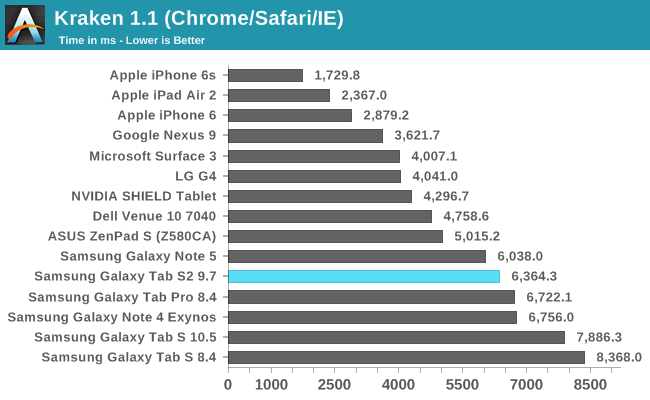
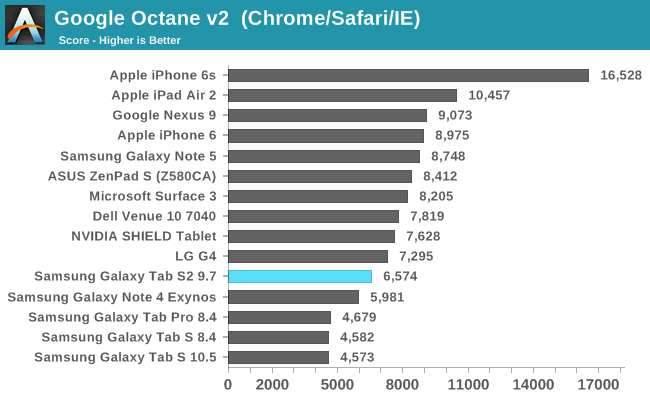
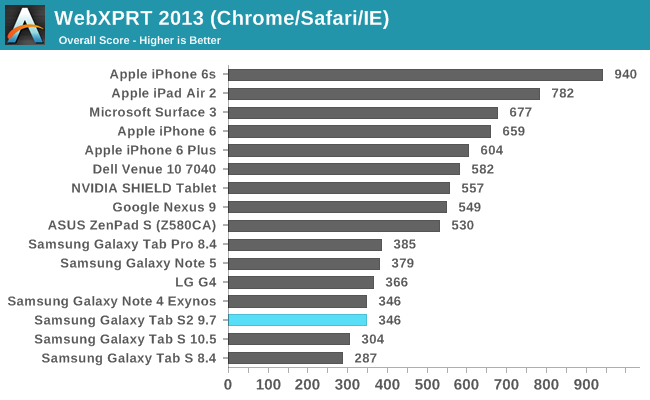
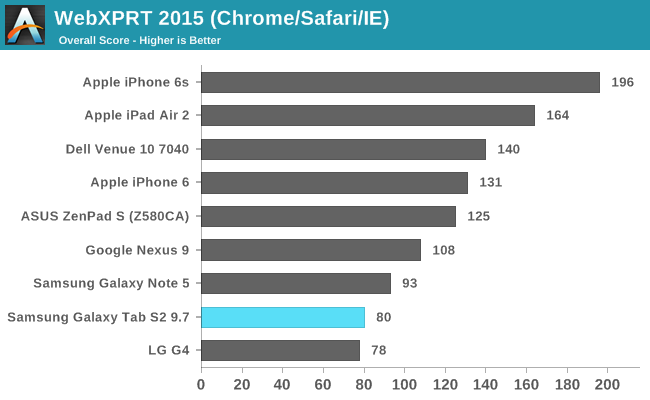
Android, and most specifically Chrome's lackluster JavaScript performance is something we've been commenting on for a while now. On top of that, the Galaxy Tab S2 simply doesn't have Samsung's latest and greatest SoC, and these factors combined together give results that aren't very impressive when one considers how much better the iPad Air 2 performs despite being over one year old at this point.
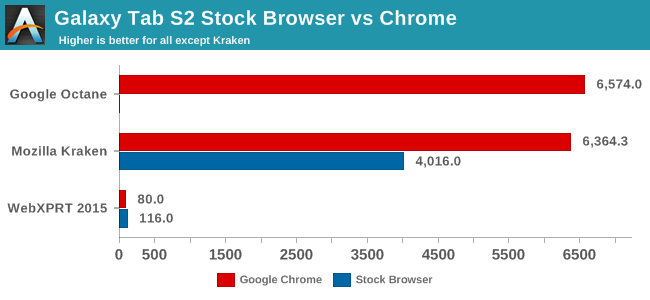
Looking at the Javascript performance in Samsung's stock browser provides some interesting but not unexpected data. It's clear that there's a much higher degree of optimization for Samsung's SoCs in their own browser than in Chrome, which isn't surprising. However, Samsung's browser isn't without its own issues. It actually crashes in the zlib test of Google Octane, and although the incomplete score of 7354 is higher than what Chrome achieves, the fact that the JavaScript code couldn't be properly executed points to some more concerning issues than performance
The other problem with using a device's stock browser for comparisons is that Android devices shipping with Google Mobile Services also include Chrome, and in my experience users are far more likely to utilize Chrome based on their awareness of the Chrome brand than they are to use the included OEM web browser. In short, while stock browser results may give a better idea of what kind of JavaScript performance a device is technically capable of, the Chrome results are more relevant when examining the performance and experience that the average user will have.
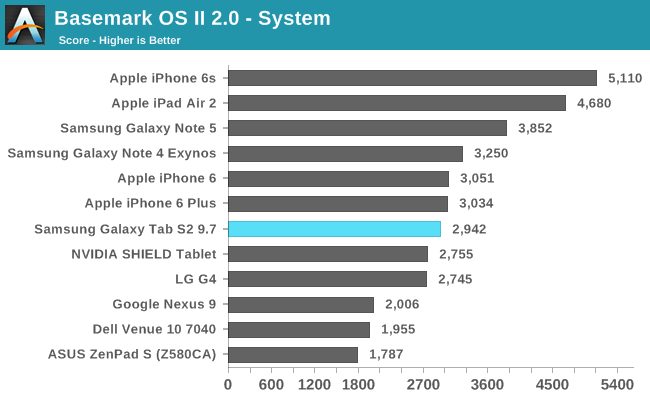
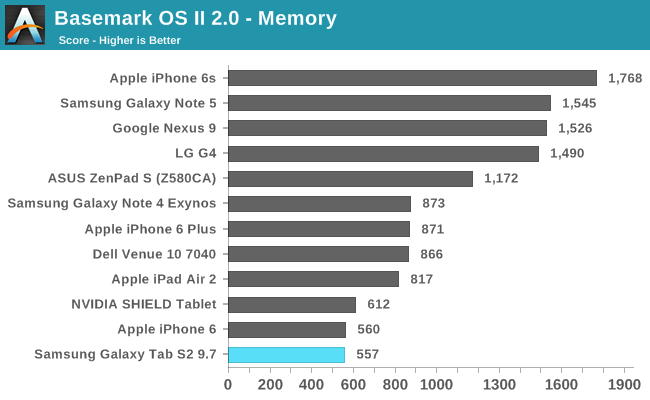
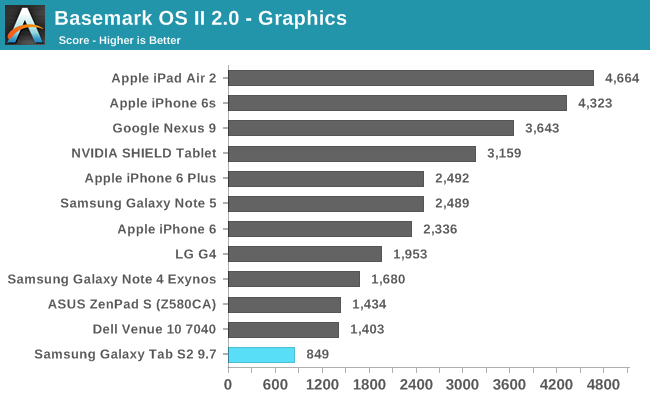
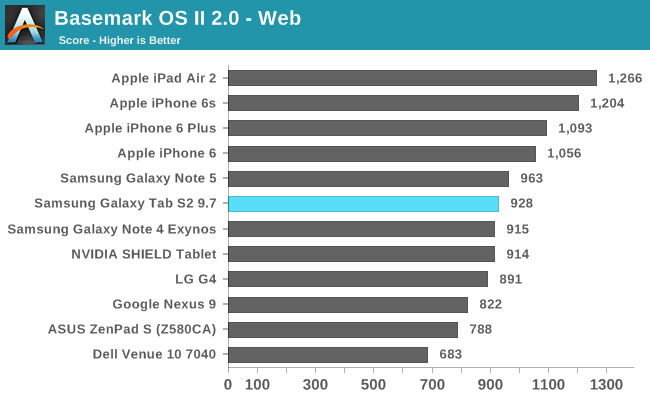
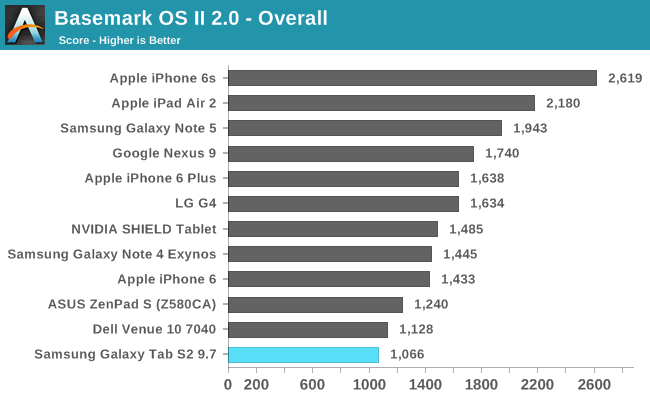
When examining the overall score in BaseMark OS II one may think that the Tab S2 performs extremely poorly. However, when looking at the sub tests it becomes clear that the overall score is being brought down by very low storage and graphics scores. What's surprising is the large gap between the graphics resuIts on the Tab S2 and the Galaxy Note 4 Exynos which uses the same Exynos 5433 SoC. I re-ran the benchmark several times to see if there was anything strange going on but there doesn't appear to be any problem with the testing, and I'm not quite sure why there's such a large gap between the two.
Moving past storage and graphics, the Tab S2 gets fairly good scores in the web and system tests. However, it still lags very far behind the iPad Air 2, and there's really no way to excuse this when both devices cost the exact same amount.
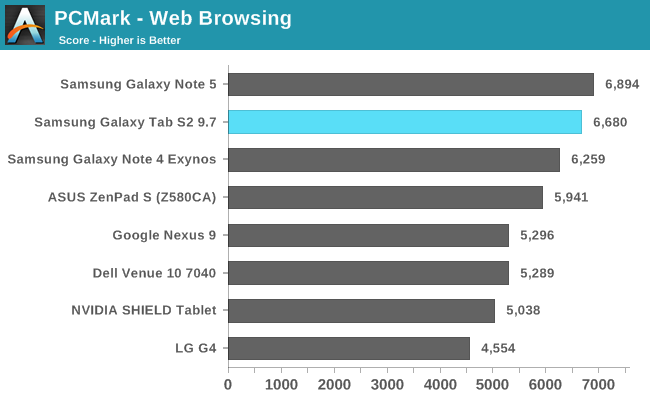
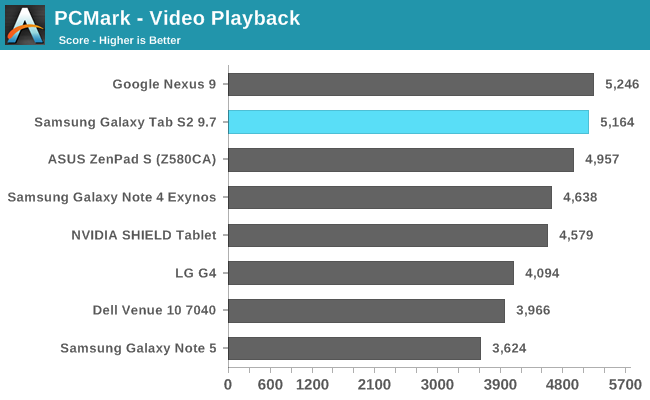
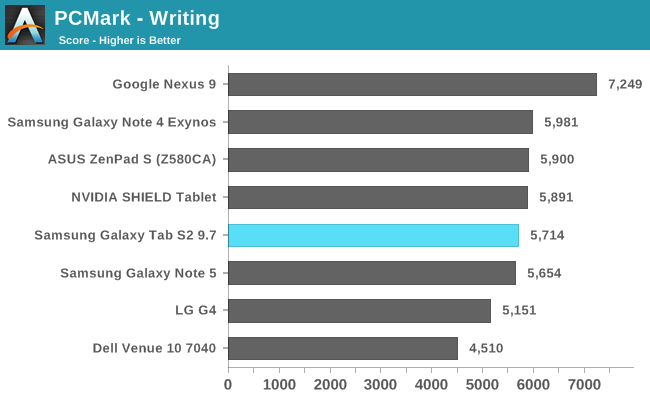
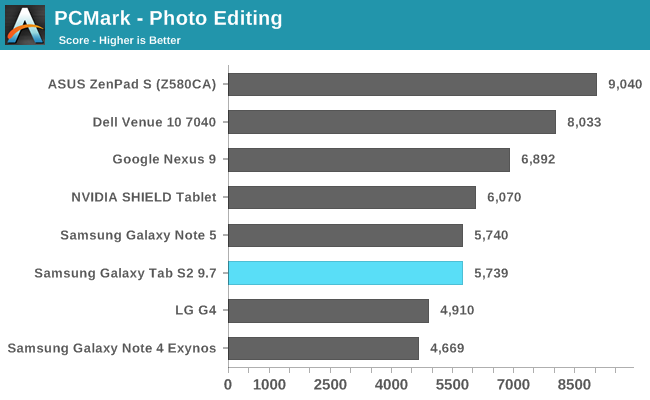
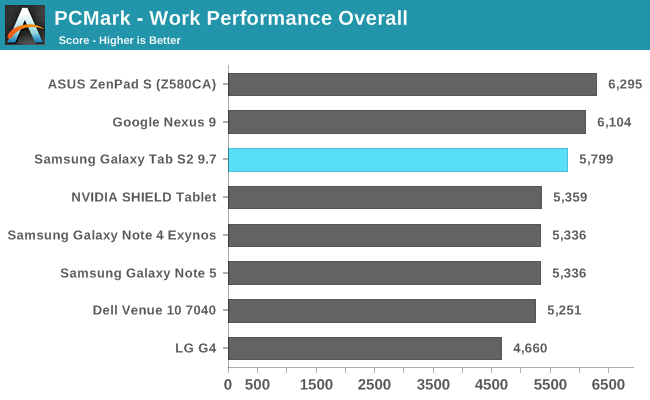
PCMark is still an Android only benchmark so the results here will strictly be comparing to other Android tablets. Overall, the Tab S2 does well. Upon examining the sub tests it can be seen that the Tab S2 is always fairly close the top of the charts, with certain devices achieving extraordinary scores in some tests which makes the Tab S2 look comparatively slower than it would be with more devices for comparison.
Exynos 5433 is not Samsung's best silicon, and even Exynos 7420 would likely struggle to compete with an SoC designed exclusively for full sized tablets. In the end the Tab S2's performance is just not competitive with the iPad Air 2 or even the Nexus 9 which is priced at $399 and often sells for even less. If I were looking at the 8" Tab S2 I would probably consider its performance acceptable relative to the competition at that size and price, but the market segment of full sized flagship tablets costing $500 or more is a completely other story.
I think Samsung definitely needs to reconsider their process of designing tablets, and part of that has to involve using chips that befit the larger size and greater capabilities of a tablet compared to a smartphone. It's in everyone's best interest to not have one company holding an enormous performance lead in any market, and if there's any company that has the capabilities, integration, and resources to fight with Apple over the tablet performance crown I would think it would be Samsung.










162 Comments
View All Comments
poopsmith - Wednesday, October 21, 2015 - link
I have, and regularly use, the previous Galaxy Tab S.There have been a lot of problems with it, I think fundamental design issues with either poor components or poor cooling. I basically only use it for Netflix and occasional browsing, so I am not pushing it heavily or anything.
But it crashes surprisingly often, and you have to get familiar with the methods to hard reset it (hold power and volume down button) which are obscure given how often they are necessary.
Lately I had an issue with the screen flickering and then it freezing after unlocking and I have had to factory reset it twice. (hold power, volume up, and home button on boot).
The initial user experience is 15 minutes of dodging email signups for creating accounts for the bloatware they install that I have gone through three times now. They also don't let you uininstall much of it. All this mandatory bloatware is probably why it crashes so often in the first place.
elindalyne - Thursday, October 22, 2015 - link
Grab a Surface 3... Not a Surface 3 Pro, not a Surface 4 Pro but a 3. Great battery life and you still get full blown Windows 10. You don't even need to get a cover or pen, but having the option is still fabulous. Not to mention the same price as the larger Tab.Also, once you use a device with a kickstand, you'll never want to go back.
UtilityMax - Sunday, October 25, 2015 - link
I have never seen my Tab S 10.5 crash. I use Netflix, Uverse, and Mx Player regularly. I am guessing you have some kind of hardware issues. I'd recommend to wire cache and return all to factory state, reinstall Netflix and see how it goes.R. Hunt - Thursday, November 26, 2015 - link
I've had my Tab S for about two months now, it's yet to crash on me. Battery life is not bad at all either. As for the bloatware, it can't be uninstalled but it can be disabled easily.UtilityMax - Sunday, October 25, 2015 - link
Once again Samsung and its mediocre tablets. Poor performance, poor battery life. Highly inconsistent benchmarks. The only positives are a good screen, an sd card slot, and a discounted price. However, don't fool yourself into thinking that you're getting some kind of a diamond in a rough type of tablet. With this one, you're getting what you're paying for.ayejay_nz - Friday, November 6, 2015 - link
I bought a Tab S 8.4 about 6 months ago and have been really disappointed with the performance. Not as disappointed as I am with myself for not researching the purchase properly though. This new generation looks just as bad on the performance front : lolibill - Saturday, December 19, 2015 - link
I have a Galaxy S2 10 and every time I plug in the original charger I get a message saying "Device charging slowly. To charge faster, use original charger " !! Does anyone know why this is, or what I can do about it?Thanks a lot.
Nightsd01 - Wednesday, January 13, 2016 - link
I've been an Apple guy for a long time. I have been using iOS since before it was even called iOS (first iPhone in 2007). I recently purchased the Galaxy Tab S2 8.0" and it is an amazing tablet. I absolutely love it. The display is stunning and the performance is snappy and fast.I purchased it so that I could have an Android device for writing Android apps, as up to this point I've been an iOS-only developer. But I'm ending up using it way more than my iPad, because it's simply more useful. There's just so much more I can do on it than on my ipad. The software isn't so strict and locked down. For example, let's say I want to scan my house WiFi to see what channels my neighbors are using (to avoid interference). On ios the WiFi hardware is very locked down and developers don't get access to it. But on android I can use WiFi scanner apps just fine. I can torrent, etc. And I am loving every minute of using this tablet. Subjectively, the display in my opinion just looks better.
Nightsd01 - Wednesday, January 13, 2016 - link
But most important of all, the storage. I bought the 32GB version for $350. Applet is still selling 16GB tablets in the year 2016, which is a JOKE. If Apple had moved to 32GB I might be a little bit less angry. But as it stands, there is NO excuse for Apple to gimp their tablets with ano unbelievable 16GB storage. It's just inexcusable.Thinkubuntu - Thursday, April 28, 2016 - link
Bought this tablet to watch HVEC encoded movies, despite the CPU ostensibly being capable of doing so it isn't implemented. As a result it struggles to decode even 720p x265 encoding and forget 10 bit! All decoding had to be done in software which kills the battery really quickly.For such a otherwise decent tablet this makes it a waste if money and a huge missed opportunity.